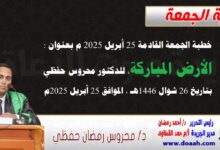Towards Better Family Relations

Sermon Plan
- The Importance of Family in Islam
- The Islamic Way to Family Stability
- Good Choice of One’s Spouse
- Care for Rights and Duties
- Love and Mercy
- Kind Treatment
- Fairness to Children
- The Impact of Family Stability on the Society
Sermon Topic
Islam paid due care for the family; it is the nuclear unit of society. When the family is good, the whole society is good and vice versa. Islam sets specific standards and criteria for family organization, safety and stability to maintain humankind and society. Islam even cares for the earlier decisions that help the creation of families. As such, Islam encourages Muslims to build families on mutual love and mercy with a view to protecting the family from destruction and fall. It shall be legally formed through marriage to maintain human dignity and sound nature. Indeed, marriage is a natural phenomenon in the universe; Allah said, “And of all things, We have created two mates—male and female; perhaps you will remember” (the Quran, 51: 49). Allah, the Almighty, also says, “Exalted is He who created all pairs – from what the earth grows and from themselves and from that which they do not know” (the Quran, 36: 36).
Marriage is a universal norm and a marvelous sign of Allah’s greatness: “It is of His signs that He created for you from yourselves mates that you may find tranquility in them; and He placed between you affection and mercy. Indeed in that are signs for a people who give thought” (the Quran, 30: 21). Therefore, family formation and stability form the Islamic way to build civilization and promote the social and national welfare. Family formation promotes chastity and virtue, protects the society from profane practices and vices, and brings families together through the ties of family relations among other noble wisdoms and purposes.
Allah, the Almighty, says, “And marry the unmarried among you and the righteous among your male slaves and female slaves. If they should be poor, Allah will enrich them from His bounty, and Allah is All-Encompassing and Knowing. (32) But let them who find no means for marriage abstain from sexual relations until Allah enriches them from His bounty. And those who seek a contract for emancipation from among whom your right hands possess—then make a contract with them if you know there is within them goodness and give them from the wealth of Allah which He has given you. And do not compel your slave girls to prostitution, if they desire chastity, to seek [thereby] the temporary interests of worldly life. And if someone should compel them, then indeed, Allah is [to them], after their compulsion, Forgiving and Merciful” (the Quran, 24: 32-33).
Likewise, the Prophet (may Allah’s Peace and Blessings be upon him) encouraged the youths to marry and said, “O young men, those among you who can support a wife should marry. Indeed, marriage restrains eyes (from casting evil glances) and preserves one from immorality; but he who cannot afford It should observe fast for it is a means of controlling the sexual desire” (al-Bukhari and Muslim).
Islam discourages all ideas and practices that go against the cultivation and settlement of the universe including celibacy and castration. Sa‘d Ibn Abi Waqqas said, “The Prophet (may Allah’s Peace and Blessings be upon him) disapproved of ‘Uthman Ibn Maz’un’s desire to remain celibate; if he had given him permission, we would have gotten ourselves castrated” (al-Bukhari).
Narrated Anas Ibn Malik (may Allah be pleased with him) narrated that a group of three men came to the houses of the wives of the Prophet (may Allah’s Peace and Blessings be upon him) asking about his worship. When they were informed of that, they considered their worship insufficient and said, “Where are we from the Prophet; his past and future sins have been forgiven.” One of them said, “I will pray throughout the night forever.” The other said, “I will fast throughout the year and will not break my fast.” The third said, “I will keep away from women and will not marry forever.” When Allah’s Messenger came, he said, “Are you the same people who said so-and-so? By Allah, I am the most pious and afraid of Allah than you all; yet I fast and break my fast, I do sleep and marry women. Then, he who does not follow my way in religion does not belong to me” (al-Bukhari).
Family stability is a legally as well as worldly required aim. As such, Islam puts the true foundations and principles for the family to maintain marital affection and love. These principles include the following:
- The right choice of one’s partner; the Prophet (may Allah’s Peace and Blessings be upon him) encourages men to choose the right wives, for they are the educators of generations and the keepers of wealth and honor. Indeed, the good wife is the best of world’s pleasures as narrated by ‘Abdullah Ibn ‘Amr from the Prophet: “This world is but a quick passing pleasure and the best of its pleasures is the good wife.” Good choice of one’s partner leads to serenity, stability, constant love and mutual mercy. Only then, marriage personifies the best grace and blessing.
- This choice must be based on religion and good ethics. Abu Hurayrah (may Allah be pleased with him) narrated that the Prophet said, “A woman is chosen as a wife for four reasons: wealth, family, beauty and religion; so win the religious woman; it is enough riches to you” (al-Bukhari). The narration of Ahmad adds, “Win the woman noted for her religion and ethics.” A wife has a great role in paying due care for the family; a good wife is the source for the stability of the family and community but a corrupt wife lead to destruction. The poet rightly said,
A mother is a school, when rightly prepared—a complete illustrious nation is prepared
- The Prophet also advises women to choose their husbands on the basis on religion and ethics. Abu Hatim al-Muzani (may Allah be pleased with him) narrated that the Prophet said, “When someone, whose religion and ethics are satisfactory, proposes [to marry any of your women], then marry her to him; otherwise, a grave chaos and corruption will take place. They said, “O Messenger of Allah, what if there is something with him? He replied, “When someone, whose religion and ethics are satisfactory, proposes [to marry any of your women], then marry her to him,” he repeated it three times” (al-Tirmidhi). In short, religion and good ethics are the basic characteristics of both men and women for the welfare and progress of families.
- Family members must respect rights and duties of one another. Each one shall do his/her duties before asking for one’s rights. Love, mercy and serenity can thus come true. Some of these rights are physical and others are moral and educational. They include the constructive participation in responsibilities and cooperation of all members to meet the needs of the family. ‘Abdullah Ibn ‘Umar (may Allah be pleased with him) heard the Prophet (may Allah’s Peace and Blessings be upon him) saying: “Everyone is a guardian and is responsible for what is in his custody; the ruler is a guardian of his people and is responsible for them; a husband is a guardian of his family and is responsible for them. Likewise, a woman is a guardian of her husband’s house and is responsible for it and a servant is a guardian of his master’s property and is responsible for it. Al-Zuhri said, “I think that ‘Abdullah added that the Prophet said, “The man is a custodian of the wealth of his father and he would be responsible for what is in his custody. Yet, everyone is a guardian and is responsible for what is in his custody” (al-Bukhari). The Prophet (may Allah’s Peace and Blessings be upon him) also said, “It is sufficient sin for a man that he neglects him whom he maintains” (Ahmad from ‘Abdullah Ibn ‘Amr).
- One of the Companions once asked the Prophet (may Allah’s Peace and Blessings be upon him): O Messenger of Allah, what is the right of a wife over a husband? He replied, “You should give her food when you eat, clothe her when you clothe yourself, do not strike her on the face, do not revile her or separate yourself from her except in the house” (Abu Dawud).
- Asmaa Bint Yazid al-Ansariyyah (may Allah be pleased with her) once asked the Prophet (may Allah’s Peace and Blessings be upon him) saying, “We, women, are limited and constrained, though we are the pillars of your houses and with us you fulfill your desires and lusts, and we carry your children. Indeed, you men have been favored over us by congregational Friday prayers and all other congregational prayers, visits of the sick, funeral prayers, performing hajj successively and better than all indeed is the jihad in the way of Allah. When anyone of you goes out for hajj, ‘umrah or jihad, we protect your wealth, spin you garments and raise your children. Shall we not share with you the same recompense and reward? The Prophet turned to his Companions and said, “Have you ever heard a better speech of a woman said, which is more beautiful than this woman’s questioning regarding the affairs of her religion?” They said, “O Messenger of Allah, we never thought that a woman should be guided to something like this.” The Prophet turned to her and said, “You can go now and tell women behind you that a woman’s good treatment with her husband, seeking his pleasure and following him is equal in reward to all that. She left while proclaiming tahleel (La Ilaha Illa Allahe. there is no god but Allah) and Takbīr (Allah Akbar i.e. Allah is the Great), in expression of her happiness. (Shu‘ab al-Imān).
- Mutual mercy is also essential for a happy and successful family. Allah, the Almighty, says, “It is of His signs that He created for you from yourselves mates that you may find tranquility in them; and He placed between you affection and mercy. Indeed in that are signs for a people who give thought” (the Quran, 30: 21). The dominance of mercy in the community is conditional upon the promotion of mercy in the family. The Prophet set the optimal example in good treatment with his wives, children, grandchildren and servants. He was the best to his family. When a family is deprived of mercy, it leads life to destruction. All members of the family must work seriously to achieve mercy.
- Kind treatment is another principle for family welfare and stability (the Quran, 4: 19); both spouses shall be kind to one another in warm intimacy and cooperation. Portraying this intimate relationship, Allah says, “They are clothing for you and you are clothing for them” (the Quran, 2: 187). He also says, “It is of His signs that He created for you from yourselves mates that you may find tranquility in them; and He placed between you affection and mercy” (the Quran, 30: 21).
- Nice word, kind behavior, tolerance, cooperation, respect, counseling, preservation of secrets and avoiding ways to disputes and difference are all essential for good treatment. The Prophet (may Allah’s Peace and Blessings be upon him) and his Companions set the best example of good treatment as narrated by al-Aswad that he asked ‘Aishah (may Allah be pleased with her): What did the Prophet use to do at home? She replied that he used to keep himself busy serving his family until it was time for prayers when he would get up for prayer (al-Bukhari).
- Ibn ‘Abbas (may Allah be pleased with him) said: “I like to beautify myself for my wife just like I love that she beautifies herself for me because Allah says, “And due to them is similar to what is expected of them, according to what is reasonable” (the Quran, 2: 228). However, I do not like to take all my rights due on her, because Allah says, “But the men have a degree over them” (the Quran, 2: 228) (Ibn Abi Shaybah, al-Musannaf).
- It is a sign of kindness not to burden one’s marital partner with your problems. Kindness is inclusive of all meanings of good marital life. Islam is keen to build the marital bond on love, mutual understanding and harmony as the foremost step to reform the society.
- Mutual consultation is also necessary between the spouses for greater friendship and love even in usual matters such as the weaning of their child. Allah, the Almighty, says, “And if they both desire weaning through mutual consent and consultation, there is no blame upon either of them” (the Quran, 2: 233). Consultation between spouses as well as other members of the family personifies the right approach of our Islamic religion. Commanding consultation is generally declared to all, as Allah says, “And those who have responded to their lord and established prayer and whose affair is determined by mutual consultation, and from what We have provided them, they spend” (the Quran, 42: 38). It is also the tradition of the Prophet as he used to consult his wives. For example, on the Day of al-Hudaybiyyah, he consulted his wife Um Salamah (may Allah be pleased with her).
- After concluding the peace treaty, the Prophet said to his companions, “Get up and slaughter your sacrifices and get your head shaved. In response, the narrator said: By Allah no one got up. The Prophet repeated his order three times. When no one got up, he left them to Um Salamah and told her of people’s negative response. Um Salamah said, “O Prophet of Allah, do you want your order to be carried out? Go out and do not say a word to anybody till you have slaughtered your sacrifice and call your barber to shave your head.” The Prophet did not talk to anyone of them till he did that. Seeing that, the companions got up, slaughtered their sacrifices and started shaving the heads of one another. There was so much rush that there was a danger of killing each other (al-Bukhari). Al-Hasan al-Basri (may Allah be pleased with him) said: The Prophet was in no need to consult Um Salamah but he wanted people to follow his example and thus men find no qualm in consulting women.
- Providing for one’s family is also essential for stable family life; all members are entitled to receive enough provision. It is a right that Islam imposes upon the man, as Allah, the Almighty, says, “Men are in charge of women by [right of] what Allah has given one over the other and what they spend [for maintenance] from their wealth” (the Quran, 4: 34). Allah, the Almighty, also says, “Upon the father is their [i.e., the mothers’] provision and their clothing according to what is acceptable. No person is charged with more than his capacity. No mother should be harmed because of her child or father because of his child. And upon the father’s heir is a duty equal to that of the father” (the Quran, 2: 233). Allah, the Almighty, also says, “Let a man of wealth spend from his wealth, and he whose provision is restricted – let him spend from what Allah has given him. Allah does not charge a soul except [according to] what He has given it” (the Quran, 65: 7).
- Fairness to all family members and educating the children the rites of religion are also indispensible. The Prophet even forewarned against unfair treatment with one’s children. Al-Nu‘mān Ibn Basheer (may Allah be pleased with him) said: “My father donated to me some of his property. My mother ‘Amrah Bint Rawahah said: I shall not be pleased until you make Allah’s Messenger a witness to that. My father went to the Prophet in order to make him the witness of the donation he gave to me. The Prophet said, “Have you done the same with all of your children?” He said: “ Thereupon the Prophet said: Fear Allah, and be just to your children. My father returned and got back the gift” (Muslim).
- For Islam, family is deeply respected and honored. It is a sacred bond that aims at achieving several high purposes. Islam is keen to keep it strong and coherent to achieve these purposes and overcome challenges and problems. Islam introduces many morals to preserve the structure of the family strong, keep the society stable and protect it from extremism, intransigence and aggression. As such, Islam cares much for family formation and stability to help the building of good social relations and achieve progress and welfare.
- When the family is stable, all members feel psychologically, physically, socially and economically safe, and thus the whole society is safe. For Islam, family stability is an effective way to bring about societal security and escape chaos and corruption. Family is the key builder of societal security and next to it come the school and the community.
Family is the first school in which a child knows the right from the wrong, the good from the evil, and learns responsibility and freedom of opinion. It forms the main features and identity of a child to become a good citizen. Security is not imposed by powers; it is maintained by the conscience of the members in the society. Actually, family plays the key role in the formation of conscience in all members.






